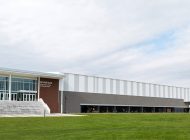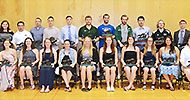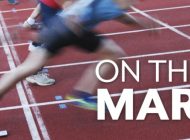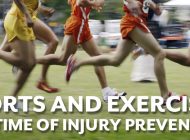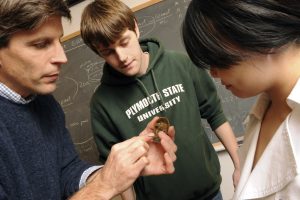by Jennifer Philion
At 1:30 on a fall Thursday afternoon, more than two hours before football practice begins, the athletic training room in PSU’s Physical Education Center comes to life.
Four athletic training students move quickly around the room, filling water bottles and coolers, rolling bandages, and restocking supplies in several containers that they will bring to Rhode Island for Saturday’s game.
Slowly, football players begin to filter in. Head football athletic trainer and faculty member Keith Belmore stands in the corner, watching his students assess player injuries, perform treatments, and expertly tape ankles, wrists, and knees for practice.
“At this time of year, the students pretty much run the show,” he says. “They know how to tape; they know what treatments are going on … I can step in if needed, but they have things under control.”
Hands-On Experience
Two of Belmore’s students are in PSU’s Master of Science in Athletic Training program; the others are seniors in the undergraduate program. Both programs are offered by the Department of Health and Human Performance. According to department chair Linda Levy, the athletic training major is an intense, hands-on educational experience.
“Few programs at PSU require students to do ongoing practical experiences, or clinical rotations,” Levy says. “These clinicals start in their sophomore year, and students do four of them before they graduate. Graduate students complete one each semester for two years.”
Student rotations with clinical staff provide a wide range of experiences in which students work with the University’s clinical staff in assessing the health of student-athletes. “They apply what they learn in the classroom in a clinical setting,” Levy says.
Courses such as anatomy, kinesiology, and injury assessment require students to learn the human body inside and out, along with hundreds of diagnostic tests, and appropriate treatments and therapies for all types of athletic injury. Even a classroom course will see students pulling up pantlegs to examine their own knees before answering a question, so the opportunity to work directly with student-athletes is invaluable.
“I’ve done clinical rotations with wrestling, softball, field hockey, women’s basketball, baseball, and now football,” senior Kevin Silva says. “One of the best things about this program is the amount of real-world experience we get. We’re involved in every step of what happens and get a lot of hands-on learning.”
Full Go, All Seasons
That level of involvement can certainly be challenging, Silva says. A former football player who was on PSU’s team his freshman and sophomore years, he compares his experiences: “Athletic training is different from being a student-athlete, where you have an in-season and an off-season. We’re full go, all seasons.”
Belmore’s team of students spend roughly 40 hours per week, six days a week, on their football clinical duties alone. They’re at every practice and travel to every game throughout the season. “It’s intense,” Silva says. “You really have to love it.”
Belmore fully understands the challenges his students are facing. He graduated from PSU’s athletic training program in 2005 before going to graduate school at the University of Missouri, where he worked with the school’s Division I football team.
“I wanted to work with football, and I wanted to work with students,” he says. When an opening came up at Plymouth State, he was excited to return as a faculty member. “This is a solid athletic training program with a good reputation,” he says. “The ability to practice what you’re learning—the amount of hands-on experience you receive—is a really strong suit of the program.”
Now, Belmore guides students through that experience. “It’s gratifying to see the maturation of the students as they evolve each year, take on more responsibilities, and progress in their knowledge and skills. I’ve seen Kevin, for example, each year in each of my sports. It’s great to watch them grow and learn over time.”
Silva will spend his final semester finishing up course requirements and preparing to take the athletic training Board of Certification exam; then he intends to move on for a master’s degree. For now, though, as football season comes to a close, he seems both excited and a bit sad to be finishing the last clinical of his undergraduate career. “I’ve been so busy for so long,” he says with a laugh. “I’m not sure what I’ll do with all my free time.”
Tags: athletic training Department of Health and Human Performance Keith Belmore Kevin Silva Linda Levy







